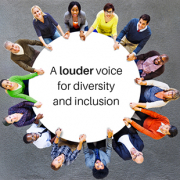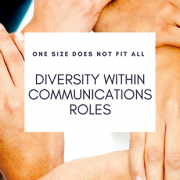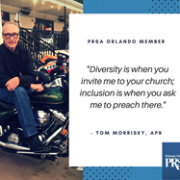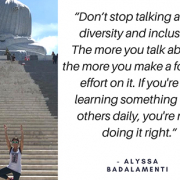The Significance of Black History Month in 2021
By: Veronica Figueroa Fernandez, PRSA Orlando Diversity & Inclusion Chair
Traditionally, the month of February is dedicated to celebrate the history and accomplishments of African Americans and their central role in American history. However, given the events that took place in the last year, such as protests calling for racial justice and an end to police brutality, Black History Month has more significance than ever in 2021. This year, it is important to go beyond the 28-day celebration and instead leverage our roles as communicators to educate our audiences, uplift Black voices and stories, and continue to advocate for change.
What follows are quotes from PRSA Orlando members when asked what Black History Month meant to them and asked about its significance in 2021:
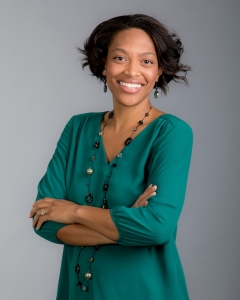 Kimberly Allen, Communications Coordinator, Seminole State College of Florida:
Kimberly Allen, Communications Coordinator, Seminole State College of Florida:
“Black History Month means honoring the stories and successes of African Americans and highlighting how these contributions form a vital piece of the collective American history. Personally and professionally, it reminds me of those who laid the foundation for who and where I am today and on whose shoulders my accomplishments rest. As a communicator, the celebration of Black history implores me not only to remember the stories of Black achievement from the past, but also to ensure they live on and that progress continues.”
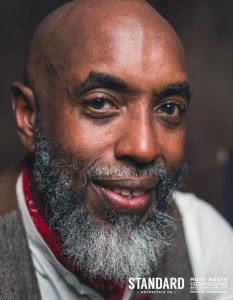 Richard Alleyne:
Richard Alleyne:
“While a 28-day observance hardly does justice to the many contributions people of African descent have made to this country, this year’s Black History Month is particularly poignant given the level of attention paid to last year’s protests around racial equity. The stark realities and grievances held by this historically marginalized group were laid bare by these civic actions and have sparked long-overdue conversations and policy reform. I remain hopeful sustained change will come and I’ll continue to do my part to help bring it about.”
 Shayla Cannady, Senior Manager, Public Relations, Orange County Public Schools:
Shayla Cannady, Senior Manager, Public Relations, Orange County Public Schools:
“As a child, my parents were intentional about exposing me to the history of Blacks in America. Today those countless lessons serve as reminders of the sacrifices made so that I may seize the opportunities that have been afforded to me over my life. Professionally, it is not only my responsibility, but my obligation, to use my education and expertise to share stories of Black Americans past and present, champion for cultural awareness through communication, and promote inclusion for all minority and marginalized groups in America. While this year, we celebrate the inauguration of the first Black woman elected as U.S. Vice President, the tragic events and repeated, fervent cries for racial justice in 2020 highlighted in the media only serve to showcase the progress that still needs to be made in this nation. For the past 45 years, America has earmarked Black History Month as a time to recognize and celebrate the achievements of individuals of African and Caribbean heritage. Twenty-eight days, however, are inadequate to cover such a robust history of success, let alone stories that include struggle and strife in this “land of the free and home of the brave.” Acknowledgment of past and current atrocities, as well as the accomplishments of Black Americans has to occur, not just in February but every day, to create a safe and brave space for dialogue, understanding, and healing current and future generations so desperately deserve.”
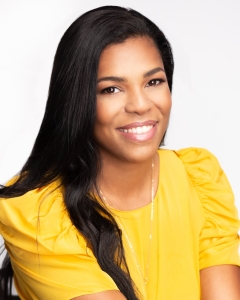 Vanessa Green-Skyrmes, Founder, VGS Communications:
Vanessa Green-Skyrmes, Founder, VGS Communications:
“As a Hispanic journalist and PR professional, Black History Month has had a positive impact on what minorities are able to accomplish. It has undoubtedly opened professional doors and along with that, it has allowed me to broadcast the importance of this month-long celebration in an act of gratitude. This is the epitome of why I value so much the influence one can have on the message that is received by an audience. Words matter and you must understand that your reputation can take years to build and mere seconds to destroy. This year, Black History Month has an even more powerful message that must be highlighted: BLACK LIVES MATTER. Following last year’s marches, it is only appropriate to heighten the significance of this celebration because the inclusivity of an entire race is worthy of being fought for and acknowledged. Those who attended marches and protests are being recognized during Black History Month along with many others who have made a difference in history because their allegiance to contribute to the greater good is how racial justice is accomplished. It has been a year of awakening and realization that even though some say the politically correct terms in regards to racial injustice and discussions, it doesn’t really mean they truly believe it. We have to be conscious of our actions, intentional with our messaging, and acknowledge that as a country we still have a lot of work to do.”
 Tyrone Law, Public Relations Specialist, Zillow:
Tyrone Law, Public Relations Specialist, Zillow:
“Black History Month began because for so long the accomplishments and contributions of Black Americans were often deliberately excluded from America’s history of growth in helping it become the most powerful country on Earth today — and the month has been observed for just four decades — let that sink in. As a professional communicator, I think of Black History Month as an awareness campaign, which has and still is contributing to what I believe is mainstream America’s shift towards a more realistic and accurately-depicted diverse and inclusive American identity. We can see this through media, policy, and various workplace activities. As a Black PR person, I get a thrill out of being able to help shape, spread, connect and influence culture and information in rooms and for organizations that many of my ancestors never had a chance to impact. As an industry, we have a long way to go in the fight towards more diverse representation at all levels, but I feel we are headed in the right direction. Happy Black History Month, PR peeps!”
 Kena Lewis, APR, Corporate Director, Public Affairs & Media Relations, External Affairs, Orlando Health:
Kena Lewis, APR, Corporate Director, Public Affairs & Media Relations, External Affairs, Orlando Health:
“Black history is a vital component of American history that, unfortunately, has not been accurately or widely shared. The result is generations of Americans who are unaware of the contributions we, as a people, have made to this great nation or of the actions taken against us to eradicate our history – both literally and figuratively. As a professional communicator, I hold myself responsible for not only providing accurate information but also for calling attention to inaccurate information and correcting it. Telling the truth is not enough. We also have to dispel untruths. Black History Month takes on even more significance in 2021. Some individuals will and are attempting to position the protests and the protesters as something other than what they were and are. We must be alert and engaged to ensure the events of 2020 are presented accurately, especially in history books, so as to not let others twist our story to fit their preferred narratives.”
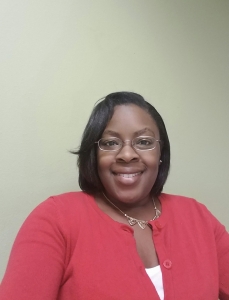 Aijana Williams, Senior Specialist, Internal Communications, Hilton Grand Vacations:
Aijana Williams, Senior Specialist, Internal Communications, Hilton Grand Vacations:
“Black History month means recognizing the incredible accomplishments of those in the Black community—past and present. It means looking at our past and seeing how far we’ve come, yet, still having so far to go. It also means providing an opportunity for others to see a broader spectrum of who Black people are. We are inventors, writers, musicians, scientists and so much more, and this is the perfect time to put it all on display and celebrate. When I think about my role as a communicator it’s important to share my unique perspective as a Black woman. Hopefully, in doing so, I lend a voice to others who may otherwise not be heard. Following last year’s protests and the light they shined on the continued racial injustices in this country, Black History Month 2021 is a chance for many to recognize that Black history is American history. You can’t separate the two. We all have a role to play in working towards a more just society for everyone.”




